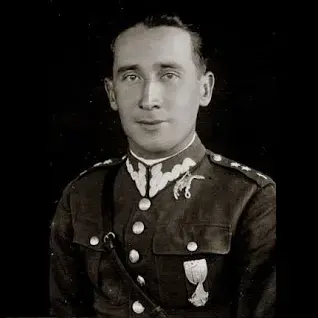
Roman CZERNIAWSKI
Roman Czerniawski was a double agent whose reports were considered accurate even by Adolf Hitler, and a silent hero of WW2 contributing to Operation Fortitude – a deception plan aimed at making Hitler believe that the Allied invasion would not take place on Normandy beaches. If agents such as Roman Czerniawski had failed, so would have the D-Day landings.
Roman was born on February 6th, 1910 inTouste, Austro-Hungary. He graduated in the late 1930s from the Wyższa Szkoła Wojenna, a military school in Warsaw, Poland. He was a Polish Air Force officer during WW2.
Roman was involved with espionage since1940, when he found himself in France after Poland’s defeat, co-organizing the Interalliée spy network. This would eventually become the largest espionage grouping in occupied France, with recently declassified files revealing the large scale and range of activities carried out by the network. Czerniawski’s aim as head of the network was to give the Allies as complete as possible a picture of German military movements and operations in France. The newly declassified files show that some reports written by Interallié spies were 400 pages long, included maps and were sometimes smuggled out of France by being photographed and carried in undeveloped film.
In November 1941, Czerniawski was arrested by the Abwehr, the German military intelligence service of the Wehrmacht after he was betrayed by his Interallié co-worker Mathilde Carré. Made aware of the consequences to his own life and those of his family should he betray them, Czerniawski agreed to collaborate with the Germans in order to save members of his Interallié network. In 1942, he became a German agent codenamed “Hubert”. He was sent to Great Britain, where he betrayed the Germans by simply becoming a British spy, who entered the counter-espionage Double-Cross System of double agents.
By pretending to collaborate, he also saw the opportunity to offer his services to the Allies when the Germans decided to send him to England as their spy. Having gained their complete trust, which would later play a major part in his success for the Allies, Czerniawski arrived in the UK in 1942 where he was taken on by MI5.
Working with a British radio operator under the pseudonym ‘Chopin’ from the attic of a residential address in Richmond Hill opposite Richmond Park in London, Czerniawski communicated false reports to the Germans about where the D-Day landings would take place, leading them to believe the main target was to be the area around Calais.
That’s when he became “Brutus”, a man who passed false information to the Germans, contributing greatly to the success of Operation Fortitude. His reports were read by Adolf Hitler, and the Abwehr even believed that he was a liaison officer to Dwight Eisenhower!
The whole point of Operation Fortitude South, which involved agent “Brutus” as the prime source of disinformation, was to draw German attention to Pas de Calais, the most probable target for the invading forces coming from southeastern England. This mis-arrangement of German forces was of critical importance in later successes as part of Operation Overlord.
Even afterwards, when the Allied troops landed on Normandy Beaches on 6 June 1944, Hitler still thought it was a ruse, and kept his best panzer divisions away, expecting the real invasion to take place in Pas de Calais. The D-Day landing would have been a disaster but for the Double-Cross System agents, including Roman Czerniawski.
"Brutus” worked for the British until the end of WW2. Thanks to his reports, V2 rockets were directed to less densely populated areas of London, which saved many lives.
After the war, Czerniawski lived a quiet life with his wife in London and wrote a book about his experiences in 1961 entitled ‘The Big Network’.
Though his wartime efforts were recognized by the Polish Government in Exile who awarded him the Virtuti Militari order in 1941. He also received the Polish Air Force medal, the Pilot wing, and the Observer wing. After the war he was secretly appointed an OBE by the Queen, but by the time he died in 1985, his heroics had been forgotten and he was virtually unknown.
London-based historian Tomasz Muskus, who carried out research into Czerniawski’s life said: “The English call Czerniawski the silent hero of WWII.
“He is not so well remembered in Poland as he is in Britain, but he is someone very worthy of our memory and he should be remembered.”
Czerniawski died in London on 26 April 1985 at the age of 75. He was buried in Newark-on-Trent in the area of Newark Cemetery for RAF burials.
Source: IPN Facebook page and The First News article.


Copyright: Czerniawski family